英文版 古代诗歌介绍
- 格式:ppt
- 大小:156.00 KB
- 文档页数:25
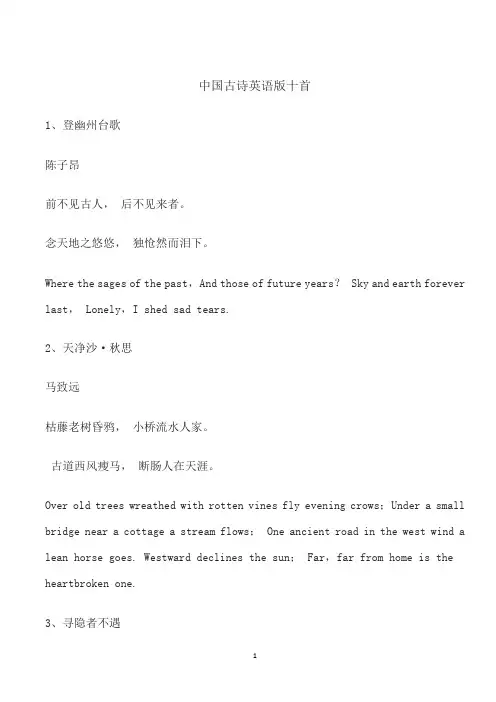
中国古诗英语版十首1、登幽州台歌陈子昂前不见古人,后不见来者。
念天地之悠悠,独怆然而泪下。
Where the sages of the past, And those of future years? Sky and earth forever last, Lonely,I shed sad tears.2、天净沙·秋思马致远枯藤老树昏鸦,小桥流水人家。
古道西风瘦马,断肠人在天涯。
Over old trees wreathed with rotten vines fly evening crows;Under a small bridge near a cottage a stream flows; One ancient road in the west wind a lean horse goes. Westward declines the sun; Far,far from home is the heartbroken one.3、寻隐者不遇贾岛松下问童子,言师采药去。
只在此山中,云深不知处。
I ask your lad neath a pine-tree,“My master’s gone for herbs,” says he.You hide amid the mountains proud,I know not where deep in the cloud.4、江雪柳宗元千山鸟飞绝,万径人踪灭。
孤舟蓑笠翁,独钓寒江雪。
From hill to hill no bird in flight, From path to path no man in sight.A lonely fisherman afloat, is fishing snow on lonely boat.5、独坐敬亭山李白众鸟高飞尽,孤云独去闲。
相看两不厌,只有敬亭山。
All birds have flown away,so high, A lonely cloud drifts on,so free. Gazing on Mount lingting,nor I, Am tired of him,nor he of me.6、问刘十九白居易绿蚁新醅酒,红泥小火炉。
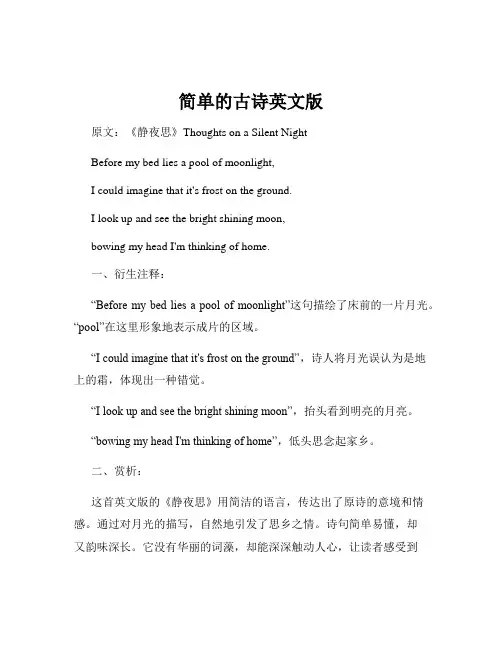
简单的古诗英文版原文:《静夜思》Thoughts on a Silent NightBefore my bed lies a pool of moonlight,I could imagine that it's frost on the ground.I look up and see the bright shining moon,bowing my head I'm thinking of home.一、衍生注释:“Before my bed lies a pool of moonlight”这句描绘了床前的一片月光。
“pool”在这里形象地表示成片的区域。
“I could imagine that it's frost on the ground”,诗人将月光误认为是地上的霜,体现出一种错觉。
“I look up and see the bright shining moon”,抬头看到明亮的月亮。
“bowing my head I'm thinking of home”,低头思念起家乡。
二、赏析:这首英文版的《静夜思》用简洁的语言,传达出了原诗的意境和情感。
通过对月光的描写,自然地引发了思乡之情。
诗句简单易懂,却又韵味深长。
它没有华丽的词藻,却能深深触动人心,让读者感受到诗人在异乡的孤独和对故乡的眷恋。
你难道不觉得这种朴素的表达反而更有力量吗?三、作者介绍:《静夜思》的作者是李白,他是唐代伟大的浪漫主义诗人,被后人誉为“诗仙”。
其诗作风格豪放飘逸、富有浪漫主义色彩,充满了奇特的想象和大胆的夸张。
他的作品涵盖了众多主题,从山水风光到人生感慨,从友情爱情到社会现实,无一不展现出他卓越的才华和广阔的胸怀。
你能想象他的创作是多么令人惊叹吗?四、运用片段:在一个远离家乡的夜晚,我独自坐在窗前,望着外面的明月。
此时,我不禁想起了英文版的《静夜思》,就如同李白在千年前的那个夜晚一样,“bowing my head I'm thinking of home”,心中满是对家的思念。
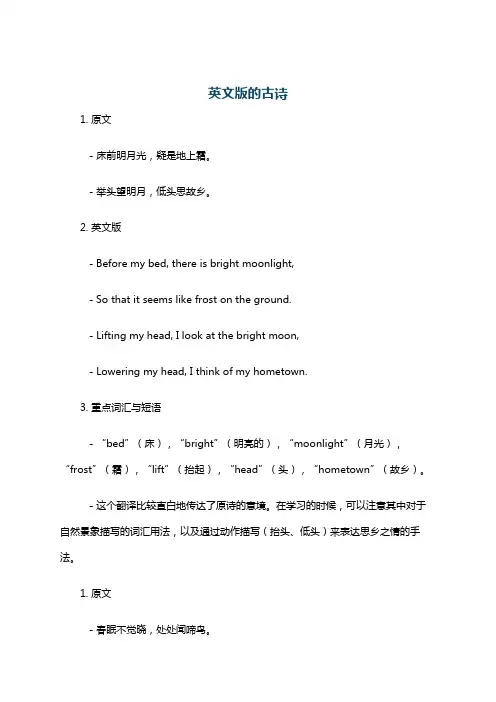
英文版的古诗1. 原文- 床前明月光,疑是地上霜。
- 举头望明月,低头思故乡。
2. 英文版- Before my bed, there is bright moonlight,- So that it seems like frost on the ground.- Lifting my head, I look at the bright moon,- Lowering my head, I think of my hometown.3. 重点词汇与短语- “bed”(床),“bright”(明亮的),“moonlight”(月光),“frost”(霜),“lift”(抬起),“head”(头),“hometown”(故乡)。
- 这个翻译比较直白地传达了原诗的意境。
在学习的时候,可以注意其中对于自然景象描写的词汇用法,以及通过动作描写(抬头、低头)来表达思乡之情的手法。
1. 原文- 春眠不觉晓,处处闻啼鸟。
- 夜来风雨声,花落知多少。
2. 英文版- This spring morning in bed I'm lying,- Not to awake till birds are crying.- After one night of wind and showers,- How many are the fallen flowers?3. 重点词汇与短语- “spring”(春天),“morning”(早晨),“lie”(躺,这里是“睡觉”的意思,lying是lie的现在分词形式),“awake”(醒来),“birds”(鸟),“wind”(风),“showers”(阵雨),“fallen”(落下的,fall的过去分词)。
- 这首诗的英文版保留了原诗的简洁风格。
学习时可以关注其中对于春天早晨景象的描写方式,以及如何用简单的词汇表达出对自然变化的一种微妙的情感(对落花的感慨)。
1. 原文- 白日依山尽,黄河入海流。
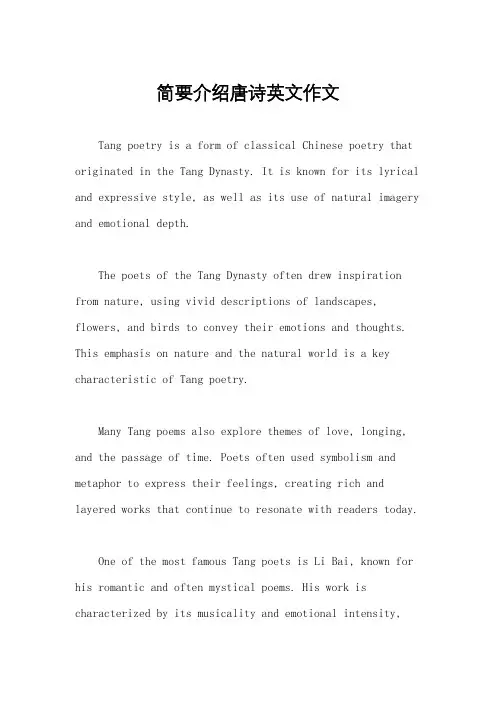
简要介绍唐诗英文作文Tang poetry is a form of classical Chinese poetry that originated in the Tang Dynasty. It is known for its lyrical and expressive style, as well as its use of natural imagery and emotional depth.The poets of the Tang Dynasty often drew inspiration from nature, using vivid descriptions of landscapes, flowers, and birds to convey their emotions and thoughts. This emphasis on nature and the natural world is a key characteristic of Tang poetry.Many Tang poems also explore themes of love, longing, and the passage of time. Poets often used symbolism and metaphor to express their feelings, creating rich and layered works that continue to resonate with readers today.One of the most famous Tang poets is Li Bai, known for his romantic and often mystical poems. His work is characterized by its musicality and emotional intensity,and he is considered one of the greatest poets in Chinese literature.Another prominent Tang poet is Du Fu, who is known for his more realistic and socially conscious poetry. His work often reflects the political and social turmoil of his time, and he is admired for his keen observations and compassionate voice.Overall, Tang poetry is celebrated for its beauty, emotional depth, and timeless themes. It continues to be studied and appreciated for its rich literary tradition and enduring relevance.。
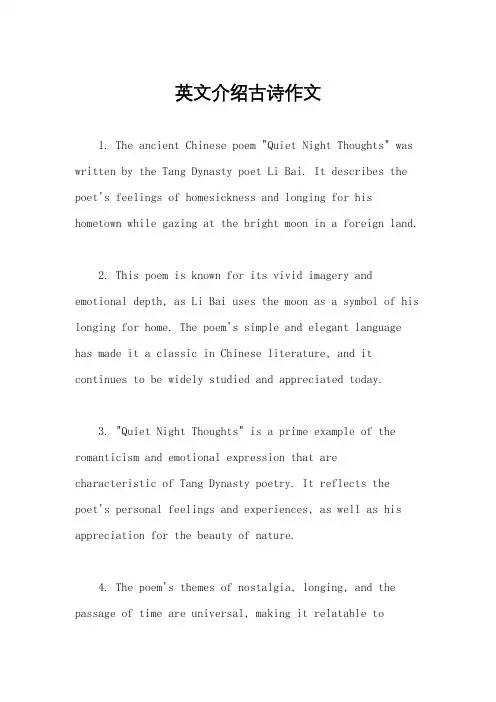
英文介绍古诗作文1. The ancient Chinese poem "Quiet Night Thoughts" was written by the Tang Dynasty poet Li Bai. It describes the poet's feelings of homesickness and longing for his hometown while gazing at the bright moon in a foreign land.2. This poem is known for its vivid imagery and emotional depth, as Li Bai uses the moon as a symbol of his longing for home. The poem's simple and elegant language has made it a classic in Chinese literature, and it continues to be widely studied and appreciated today.3. "Quiet Night Thoughts" is a prime example of the romanticism and emotional expression that arecharacteristic of Tang Dynasty poetry. It reflects thepoet's personal feelings and experiences, as well as his appreciation for the beauty of nature.4. The poem's themes of nostalgia, longing, and the passage of time are universal, making it relatable toreaders from different cultural backgrounds. Its enduring popularity is a testament to its timeless appeal and emotional resonance.5. In conclusion, "Quiet Night Thoughts" is a poignant and evocative poem that captures the universal emotions of longing and nostalgia. Its enduring popularity and continued relevance make it a beloved classic in the world of Chinese literature.。

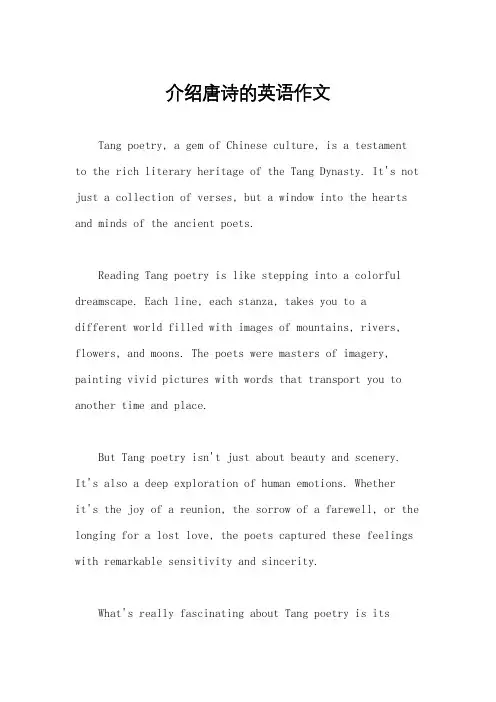
介绍唐诗的英语作文Tang poetry, a gem of Chinese culture, is a testament to the rich literary heritage of the Tang Dynasty. It's not just a collection of verses, but a window into the hearts and minds of the ancient poets.Reading Tang poetry is like stepping into a colorful dreamscape. Each line, each stanza, takes you to adifferent world filled with images of mountains, rivers, flowers, and moons. The poets were masters of imagery, painting vivid pictures with words that transport you to another time and place.But Tang poetry isn't just about beauty and scenery.It's also a deep exploration of human emotions. Whetherit's the joy of a reunion, the sorrow of a farewell, or the longing for a lost love, the poets captured these feelings with remarkable sensitivity and sincerity.What's really fascinating about Tang poetry is itsdiversity. You have poems that are light and playful, like songs of love and merriment. And then you have poems that are profound and philosophical, reflecting on life, death, and the universe.And let's not forget the rhythm and melody of Tang poetry. They're designed to be recited aloud, their lines flowing together like a symphony. It's not just reading the words; it's feeling the music of the language.In conclusion, Tang poetry is more than just a literary genre; it's a cultural phenomenon. It's a part of our history, our identity, and our heritage. It。
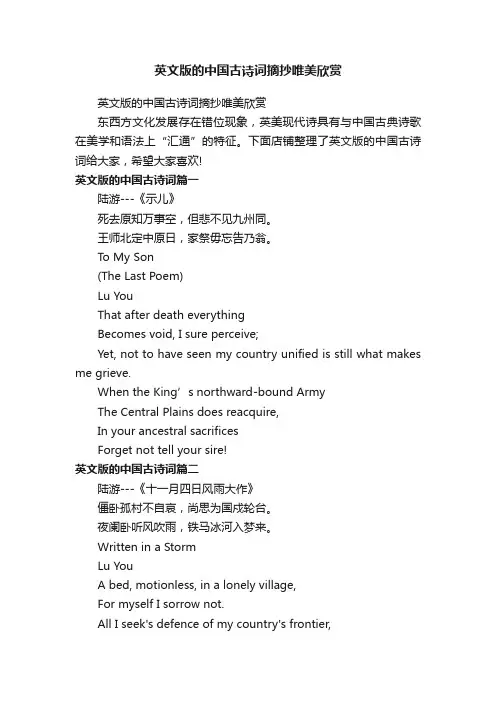
英文版的中国古诗词摘抄唯美欣赏英文版的中国古诗词摘抄唯美欣赏东西方文化发展存在错位现象,英美现代诗具有与中国古典诗歌在美学和语法上“汇通”的特征。
下面店铺整理了英文版的中国古诗词给大家,希望大家喜欢!英文版的中国古诗词篇一陆游---《示儿》死去原知万事空,但悲不见九州同。
王师北定中原日,家祭毋忘告乃翁。
To My Son(The Last Poem)Lu YouThat after death everythingBecomes void, I sure perceive;Yet, not to have seen my country unified is still what makes me grieve.When the King’s northward-bound ArmyThe Central Plains does reacquire,In your ancestral sacrificesForget not tell your sire!英文版的中国古诗词篇二陆游---《十一月四日风雨大作》僵卧孤村不自哀,尚思为国戍轮台。
夜阑卧听风吹雨,铁马冰河入梦来。
Written in a StormLu YouA bed, motionless, in a lonely village,For myself I sorrow not.All I seek's defence of my country's frontier,And to me a station there allot.Lying in the depth of the night I listenTo the winds blowing the rain,And iron-clad horses o'er frozen rivers,As of old, invade my dreams again.英文版的中国古诗词篇三《望月怀远》张九龄海上生明月,天涯共此时。
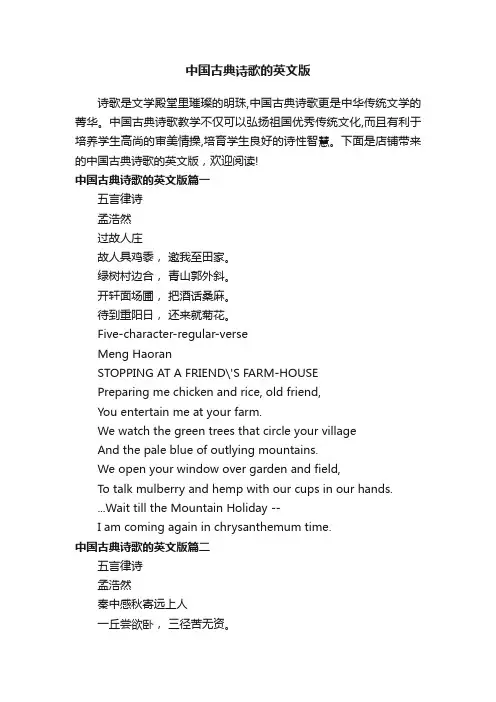
中国古典诗歌的英文版诗歌是文学殿堂里璀璨的明珠,中国古典诗歌更是中华传统文学的菁华。
中国古典诗歌教学不仅可以弘扬祖国优秀传统文化,而且有利于培养学生高尚的审美情操,培育学生良好的诗性智慧。
下面是店铺带来的中国古典诗歌的英文版,欢迎阅读!中国古典诗歌的英文版篇一五言律诗孟浩然过故人庄故人具鸡黍,邀我至田家。
绿树村边合,青山郭外斜。
开轩面场圃,把酒话桑麻。
待到重阳日,还来就菊花。
Five-character-regular-verseMeng HaoranSTOPPING AT A FRIEND\'S FARM-HOUSEPreparing me chicken and rice, old friend,You entertain me at your farm.We watch the green trees that circle your villageAnd the pale blue of outlying mountains.We open your window over garden and field,To talk mulberry and hemp with our cups in our hands....Wait till the Mountain Holiday --I am coming again in chrysanthemum time.中国古典诗歌的英文版篇二五言律诗孟浩然秦中感秋寄远上人一丘尝欲卧,三径苦无资。
北土非吾愿,东林怀我师。
黄金燃桂尽,壮志逐年衰。
日夕凉风至,闻蝉但益悲。
Five-character-regular-verseMeng HaoranFROM QIN COUNTRY TO THE BUDDHIST PRIEST YUAN How gladly I would seek a mountainIf I had enough means to live as a recluse!For I turn at last from serving the StateTo the Eastern Woods Temple and to you, my master....Like ashes of gold in a cinnamon-flame,My youthful desires have been burnt with the years-And tonight in the chilling sunset-windA cicada, singing, weighs on my heart.中国古典诗歌的英文版篇三五言律诗孟浩然宿桐庐江寄广陵旧游山暝听猿愁,沧江急夜流。
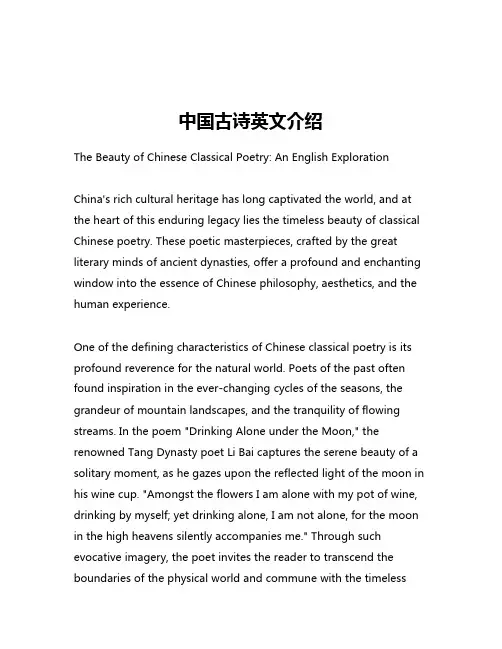
中国古诗英文介绍The Beauty of Chinese Classical Poetry: An English ExplorationChina's rich cultural heritage has long captivated the world, and at the heart of this enduring legacy lies the timeless beauty of classical Chinese poetry. These poetic masterpieces, crafted by the great literary minds of ancient dynasties, offer a profound and enchanting window into the essence of Chinese philosophy, aesthetics, and the human experience.One of the defining characteristics of Chinese classical poetry is its profound reverence for the natural world. Poets of the past often found inspiration in the ever-changing cycles of the seasons, the grandeur of mountain landscapes, and the tranquility of flowing streams. In the poem "Drinking Alone under the Moon," the renowned Tang Dynasty poet Li Bai captures the serene beauty of a solitary moment, as he gazes upon the reflected light of the moon in his wine cup. "Amongst the flowers I am alone with my pot of wine, drinking by myself; yet drinking alone, I am not alone, for the moon in the high heavens silently accompanies me." Through such evocative imagery, the poet invites the reader to transcend the boundaries of the physical world and commune with the timelessrhythms of nature.Another hallmark of Chinese classical poetry is its profound exploration of the human condition. Poets delved into the depths of emotion, contemplating the joys and sorrows, the triumphs and tribulations, that define the human experience. In the poem "Thoughts on a Quiet Night," the Tang Dynasty poet Li Shangyin reflects on the bittersweet nature of life, as he gazes upon the moonlight that illuminates his solitary night. "Amidst the flowers, a single candle burns brightly, casting its light upon the flickering shadows. In the silence of the night, I am deep in thought, pondering the transience of all things." Through these poignant words, the poet invites the reader to engage in a universal meditation on the fleeting nature of human existence and the poignant beauty that can be found within it.The formal structure of Chinese classical poetry also plays a crucial role in its enduring appeal. Adhering to strict metrical patterns and rhyme schemes, these poems often employ a rich tapestry of literary devices, including parallel structures, allusions, and imaginative metaphors. The poem "Changgan River" by the Tang Dynasty poet Li Bai exemplifies this artistic mastery, as the poet weaves a captivating narrative of a lonely journey down the Changgan River. "The river flows on, the endless river, winding its way through mountains and valleys. My boat drifts on, as I gaze at the distant shore, my heartheavy with the weight of parting." The rhythmic cadence of the verse, combined with the vivid imagery, transports the reader into the heart of the poet's emotional journey, evoking a profound sense of longing and melancholy.The enduring influence of Chinese classical poetry can be seen in its profound impact on the literary traditions of East Asia and beyond. Poets and scholars from Japan, Korea, and Vietnam have long studied and celebrated the masterpieces of the Chinese poetic canon, drawing inspiration from their timeless themes and artistic brilliance. Even in the modern era, contemporary writers and artists continue to find resonance in the timeless wisdom and beauty of these ancient verses, using them as a springboard for their own creative expressions.In conclusion, the richness and complexity of Chinese classical poetry are a testament to the profound depths of human creativity and the universal appeal of artistic expression. Through these poetic masterpieces, we are invited to explore the mysteries of the natural world, to delve into the depths of the human experience, and to discover the enduring power of language to transcend the boundaries of time and space. As we immerse ourselves in the beauty of these ancient verses, we find ourselves drawn into a timeless conversation, one that continues to inspire and captivate audiences across the globe.。
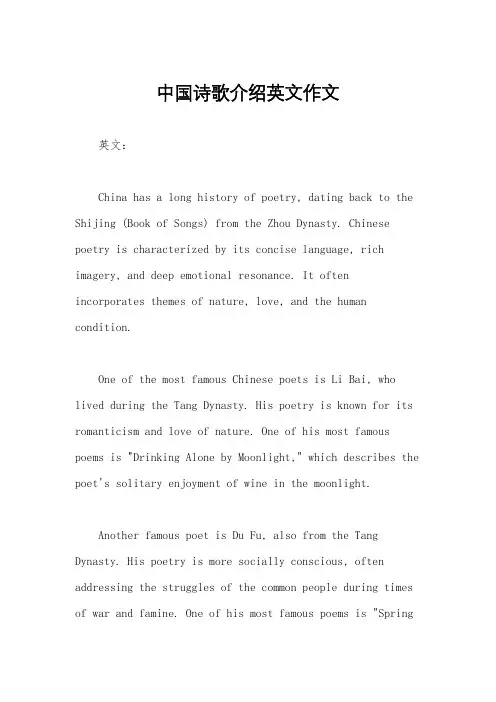
中国诗歌介绍英文作文英文:China has a long history of poetry, dating back to the Shijing (Book of Songs) from the Zhou Dynasty. Chinese poetry is characterized by its concise language, rich imagery, and deep emotional resonance. It often incorporates themes of nature, love, and the human condition.One of the most famous Chinese poets is Li Bai, who lived during the Tang Dynasty. His poetry is known for its romanticism and love of nature. One of his most famous poems is "Drinking Alone by Moonlight," which describes the poet's solitary enjoyment of wine in the moonlight.Another famous poet is Du Fu, also from the Tang Dynasty. His poetry is more socially conscious, often addressing the struggles of the common people during times of war and famine. One of his most famous poems is "SpringView," which describes the beauty of nature in the springtime.In modern times, there have been many influential poets in China, such as Ai Qing, who wrote about the struggles of the Chinese people during the Cultural Revolution, and Bei Dao, who is known for his minimalist style and political commentary.中文:中国有着悠久的诗歌历史,可以追溯到周代的《诗经》。
介绍中国古诗英语作文Ancient Chinese poetry is a treasure trove of wisdom and beauty. It captures the essence of life, love, and nature in a few simple yet profound lines. These poems have been passed down through generations, and continue to inspire and move people around the world.The beauty of Chinese poetry lies in its ability to convey complex emotions and ideas in a few concise words. Each poem is like a painting, with vivid imagery and deep meaning. Whether it's a poem about the beauty of nature, the pain of lost love, or the joy of friendship, Chinese poetry has a way of speaking to the human soul.One of the most famous poets in Chinese history is Li Bai, also known as Li Po. His poems are known for their romanticism and passion, and often reflect his love for nature and freedom. Another renowned poet is Du Fu, whose works are more introspective and philosophical, offering insights into the human condition and society.Chinese poetry is often characterized by its use of symbolism and allusion. Many poems reference historical events, myths, and legends, adding layers of meaning to the words. This makes Chinese poetry a rich and rewarding experience for those who take the time to explore its depths.In recent years, Chinese poetry has gainedinternational recognition, with more and more translations being made available to a global audience. This has allowed people from different cultures to appreciate the beauty and wisdom of ancient Chinese poetry, and to find common ground in the universal themes it explores.In conclusion, Chinese ancient poetry is a timeless art form that continues to captivate and inspire people all over the world. Its ability to convey profound emotions and ideas in just a few lines is a testament to the power of language and human creativity. Whether you are a poetry lover or someone looking for insight into the humanexperience, Chinese poetry has something to offer to everyone.。
英语作文介绍一首古诗The moon shines bright, casting its silver light overthe tranquil night. This is the opening line of the famous Tang dynasty poem "Quiet Night Thoughts" by Li Bai. The poem describes the poet's feelings of loneliness and homesickness as he gazes at the moon from afar.The poem is filled with vivid imagery and powerful emotions. Li Bai's use of language is both simple and profound, allowing readers to easily connect with the sentiments expressed in the poem. The moon, a common motifin Chinese poetry, is used to symbolize the longing for home and the passage of time."Quiet Night Thoughts" is considered one of thegreatest works of Chinese literature. It has been widely studied and admired for its timeless themes and beautiful language. The poem continues to resonate with readers today, capturing the universal experience of longing and nostalgia.In conclusion, "Quiet Night Thoughts" is a masterpiece of Chinese poetry that continues to captivate readers with its evocative imagery and heartfelt emotions. Li Bai's skillful use of language and his ability to convey complex emotions in a simple and direct manner make this poem a timeless classic.。
英语作文古代诗歌The moon shines bright, casting its silver light on the earth. The night is quiet, the air is cool. I sit alone, thinking of my love, who is far away. Oh, how I long for the day when we can be together again.The flowers bloom in the spring, filling the air with their sweet fragrance. I walk through the fields, feeling the gentle breeze on my face. My heart is light, my spirit is free. I am at peace, surrounded by nature's beauty.The river flows, its water glistening in the sunlight.I stand on the bank, watching the ripples dance and play. The sound of the water soothes my soul, calming my troubled mind. I am content, finding solace in the rhythm of the river.The mountains rise, their peaks reaching for the sky. I climb to the top, feeling the earth beneath my feet. The view is breathtaking, the world spread out before me. I amhumbled, in awe of the majesty of the mountains.The wind whispers, carrying secrets from far away. I listen, straining to catch the elusive words. The voices of the past speak to me, telling tales of love and loss. I am moved, touched by the echoes of history.The stars twinkle, painting patterns in the night sky.I gaze up, lost in the vastness of the universe. The beauty of the cosmos fills me with wonder, reminding me of my place in the grand scheme of things. I am small, but I am part of something greater than myself.。
介绍古诗英文作文The ancient Chinese poetry is full of profound wisdom and beautiful imagery. It captures the essence of life and nature in a few simple and elegant lines, leaving a lasting impression on the reader's heart.The poets of ancient China often drew inspiration from the natural world, using vivid descriptions of landscapes, seasons, and natural phenomena to convey their emotions and thoughts. Their words have the power to transport the reader to a different time and place, evoking a sense of wonder and nostalgia.The language of ancient Chinese poetry is rich and evocative, filled with symbolism and metaphor. Each character and phrase is carefully chosen to create a specific mood or atmosphere, inviting the reader to contemplate the deeper meaning behind the words.Many of the ancient Chinese poems are imbued with asense of longing and melancholy, reflecting the transient nature of life and the beauty of impermanence. They remind us to cherish the present moment and appreciate thefleeting beauty of the world around us.The themes of love, loss, and longing are often explored in ancient Chinese poetry, expressing the universal emotions that transcend time and culture. The poets' heartfelt words resonate with readers across the ages, touching the soul and stirring the imagination.The brevity and simplicity of ancient Chinese poetry are part of its enduring charm. In just a few lines, a poet can capture the essence of a profound truth or a fleeting emotion, leaving a lasting impact on the reader's heart and mind.In conclusion, ancient Chinese poetry is a treasure trove of wisdom, beauty, and emotion. Its timeless appeal continues to captivate readers around the world, offering a glimpse into the rich cultural heritage of China and the universal truths of the human experience.。
古诗介绍英文作文Ancient Chinese poetry is a treasure trove of art and culture. These beautiful verses, written by poets from different dynasties, capture the essence of life, love, and nature. They are like windows into the past, allowing us to glimpse into the hearts and minds of those who lived centuries ago.When reading ancient Chinese poetry, one can't help but be struck by the simplicity and elegance of the language. The poets often use vivid imagery and metaphors to convey their emotions and thoughts. For example, in Li Bai's famous poem "Quiet Night Thoughts," he writes, "The moon shines bright, a frosty light, on the bed before me." This simple yet powerful image creates a sense of tranquility and solitude.Another characteristic of ancient Chinese poetry is its emphasis on nature. Many poems describe the beauty of mountains, rivers, and flowers. For instance, in Wang Wei'spoem "Deer Park," he writes, "In the mountains, there is a hidden path, where the deer roam freely." This line notonly portrays the serenity of the natural world but also suggests a deeper meaning of finding one's own path in life.In addition to nature, love is a recurring theme in ancient Chinese poetry. Poets often express their longing and desire for their loved ones through their verses. For example, in Li Qingzhao's poem "Song of Everlasting Regret," she writes, "In the spring breeze, the flowers bloom, but my heart is filled with sorrow." This line beautifully captures the bittersweet feeling of love andthe pain of separation.Moreover, ancient Chinese poetry often reflects the values and beliefs of the time. Confucianism, Taoism, and Buddhism heavily influenced the thoughts and writings ofthe poets. For instance, in Du Fu's poem "Spring View," he writes, "The river flows east, the flowers bloom, and the world is filled with joy." This line reflects the poet's optimism and belief in the cyclical nature of life.In conclusion, ancient Chinese poetry is a rich and diverse form of art. Its language, imagery, and themes continue to captivate readers today. Whether it is the simplicity of expression, the depiction of nature, the exploration of love, or the reflection of cultural values, these poems offer a glimpse into a bygone era and remind us of the timeless beauty of the written word.。
介绍中国古诗的英语作文,高中版Ancient Chinese PoetryPoetry has been a huge part of Chinese culture for thousands of years. Even as kids, we learn ancient poems in school from a very young age. Chinese people feel a deep connection to the beautiful words and images expressed in these classic works.What makes ancient Chinese poetry so special? Well, for one thing, it has lasted an incredibly long time. Many of the most famous poems are from over 2,000 years ago during the Tang Dynasty! Just think about that - people were writingmind-blowing poems back when Europe was still living in the medieval times. Pretty crazy, right?Another cool thing is how the poems capture the incredible natural beauty of the Chinese landscapes. From misty mountains to peaceful rivers to blossoming flowers, the descriptive language truly paints a picture in your mind. The poets use a lot of symbolism and imagery related to nature.Most ancient Chinese poems follow very specific patterns and formats too. There are strict rules about things like line length, tones, rhyme schemes, and parallel phrasing. It's likepoetry Mad Libs! This structure seems boring at first, but it actually creates really musical and satisfying rhythms when you read them out loud.Many of the poems also have deeper meanings beyond just the words on the page. The verses are full of philosophical ideas about life, morality, and humanity's place in the universe. Poets shared their profound thoughts and insights through artful language and analogies. It makes you think!Two of the most famous poetic forms are gushi and jintishi. Gushi poems have four or eight lines, while jintishi have eight lines with a strict tonal pattern. Let me give you some examples to get a feel for how they read:A famous gushi poem is "Quatrain on a Thatched Hut" by Zhu Xi:"Thatched hut amidst the woods,Sheltered from inked bookish broods,For me there's no greater blissThan reading beside the bamboo abyss."Short but beautifully descriptive, right? You can vividly picture the simple little hut in a bamboo grove where a scholar finds peace and happiness just reading in nature.Here's a jintishi poem called "My Thatched Hut was Remade" by Cui Hu:"For a time I stayed away, but now am back again,To see the thatch on my hut renewed after the rain.Who will share with me this pleasant sight?Happy I'd be with just clouds eternal, so white.Leaning to prod a pen, thoughts would sluggishly run;Raising my wine cup, I'd find the moon already gone.Truth is, I was meant for fields and gardens such as these -Simple as shepherd girls loosening their braided hair in the breeze."Doesn't that make you feel calm and serene? The poet describes little moments of life in a thatched hut and rustic natural surroundings. You almost feel like you're there alongside him.Those are just a couple examples, but there are countless other masterpieces by legendary poets like Li Bai, Du Fu, and Su Shi. Their profound words have been admired and studied for centuries.Writing poetry was actually an important way for scholars and officials to express their thoughts and insights back in ancient China. Unlike today where most poets live as artists, back then poetry was an essential part of intellectual life. Some of the most famous poets were also great philosophers, politicians, and historians.Poems were written about everything from romantic love to the beauty of nature to deep metaphysical questions about existence. Whatever the subject, the artists used creative language and vivid imagery to convey their ideas in an impactful way. Just a few carefully crafted lines could capture remarkably powerful emotions and concepts.That level of artistry and deep thinking is why ancient Chinese poetry has had such a lasting impact. These classic works have survived for over two millennia because their wisdom, beauty, and mastery of language still resonates with people today.Even in our modern world, the ancient Chinese poems continue to be celebrated, analyzed, and admired across the globe. They are studied as great literary achievements but also as insightful philosophical works. Magnificent poems from thousands of years ago still have so much to teach us.These treasured verses are pretty amazing when you think about it. In just a few short lines, ancient poets could express incredible depth of emotion and meaning through symbolism and vivid imagery. Their wise words capture the purest and most profound truths about the human experience. That's the magic of ancient Chinese poetry!。